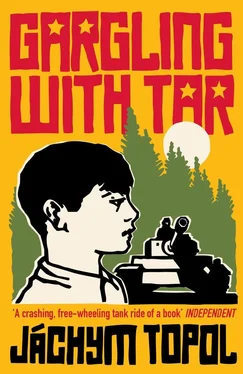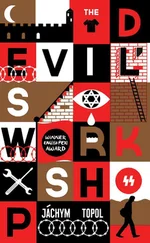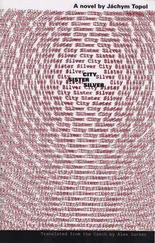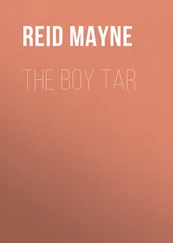Commander Baudyš and Karel were fussing around the trolley, and Commander Žinka was still going on and on. We heard, but we didn’t listen, until he said, ‘While the representatives of a regenerated Czechoslovakia are defending socialism with a human face at the meeting in Čierna nad Tisou…,’ then Bajza got a fit of the giggles and started squirming, his lips twitching, and quietly muttered, ‘Arsehole.’ Commander Žinka leaned towards us from the trolley. ‘You boy,’ he said, ‘have you got epilepsy?’ and Páta roared, ‘Nah, he’s got syphilis!’ and that was the end of Commander Žinka’s speech. We got up, but something had changed.
Something had changed because Commander Baudyš suddenly turned to go. He looked back just once and ran an eye over our formation, which had begun to stand easy without being ordered to, and he just went… he was leaving. Just like that! Karel trotted after him and he was running, and we stared open-mouthed after our mate Karel, and when Karel caught up with Commander Baudyš he fell in two steps behind him with the easy stride of a detachment on the march, then both of them slowly disappeared from sight and we were left gawping at each other, and Dýha shouted, ‘Hey! Karel! Come back!’ and carried on like that, hopping up and down, but Karel couldn’t hear him, or if he could he pretended not to.
And crutchy Commander Žinka watched it all, with his head held high and his chin stuck out, looking sidelong after the departing Commander Baudyš, and we all clustered round the trolley. Then Chata kicked me in the leg and Bajza tugged at my sleeve. I’m commander of the saboteurs! Chata and Bajza and me, we crawled under the footbridge, looking around the rocks, and poked at the dark water with sticks. All we could find was the blanket. No Martin. We were glad. I saw Chata and Bajza smiling and chattering away in their own language, so I told them to speak normal.
Bajza flung his stick in the water. ‘He did the right thing,’ he said. ‘You have to dump stuff when you’re escaping. ’Cause of dogs and things.’
‘There ain’t no dogs to chase escapees here,’ I said, as if they didn’t know.
‘All dogs chase escapees,’ Chata said.
‘So where’d he get to?’ Bajza asked.
‘He doesn’t know where the cemetery with the tomb is,’ I said. ‘He isn’t one of us saboteurs!’
‘Only a Whitey could escape down the main road,’ said Chata.
‘Hmm,’ said Bajza, and I also said, ‘Hmm,’ though I’d never done a runner.
‘He could still be downstream, couldn’t he?’ I said. ‘Carried by the water, no?’ I looked across the water, and it was washing over the scrap iron and other stuff in the tip across the stream.
They both laughed and went on in their own language. That pissed me off.
‘The stones wouldn’t let him pass,’ Bajza explained with a grin, as if he were talking to some idiot, though he was smaller than me.
We clambered onto the bank.
The lads were now on the road by the trolley and the pickup. If our longshirts had happened along and squashed up tight, they would have all fitted on. We could all have gone somewhere. But that wasn’t going to happen.
Commander Žinka sat in the pickup’s cab. He had chucked his crutches on the floor, and we could see his stumps wrapped in great big leather patches… As he sat there, we could see that he was huge, with paws like a bear out of Chapman Forest. He was explaining stuff to the lads and doing great things with his hands among the tools: ‘And this is a loudspeaker, lads, and this is an amplifier,’ and he kept pulling stuff off the pickup and more stuff off the trolley. The lads handed him at once whatever he pointed to, and he put it all together and then he was holding the loudspeaker with wires hanging from it… He had loads of these loudspeaker things on the back of the pickup… ‘And you screw it together here, and so we’ve got a public address system and the revolution can begin any time you like, my lads.’ Commander Žinka smiled at them and the lads were laughing too, having fun, listening… But I couldn’t be bothered. I dunno what’s wrong with me.
‘Boys,’ said Commander Žinka, ‘we’ll go into the village now and hang the wires and loudspeakers up, then we can inform the villagers about what’s going on in Czechoslovakia!’
Dýha asked if we would be able to talk into a loudspeaker.
Žinka reached out a gigantic paw and smiled and patted Dýha on the shoulder, and he said, ‘I like your initiative, boy. What would you say into it?’
‘That altar boys are buggers, Commander, sir,’ said Dýha, making such a funny face that we fell about laughing.
Commander Žinka said, ‘No, that’s not a good idea. But anyway, let’s get going.’
Dýha and Páta led the procession, pushing the trolley along. The pickup followed them at a walking pace, and behind it there was us, the Bandits, and we were sorry we weren’t on field manoeuvres. It would have been better to go into the village with airguns.
*
The pickup stopped outside the first farmhouse, belonging to the Kropáčeks. Commander Žinka pulled a stepladder off the pickup, opened it and swung himself onto it straight from the cab. He jammed his stumps between the rungs until his leather patches squeaked, helping himself along with his teeth. Then he fixed the first loudspeaker to the Kropáčeks’ fence, and Mr Kropáček came out and said, ‘What’s all this, then?’
Commander Žinka handed him a sheet of paper. Mr Kropáček had to sign it and, syllable by syllable, he worked out that he was accepting material responsibility for the loudspeaker, and he gawped and said, ‘And comrade, sir… erm, Mr Comrade…’
‘Address me as “Commander”!’ ordered Commander Žinka.
‘Will you have a dram, Commander?’
‘But of course!’ said Commander Žinka. Grabbing the top rungs, he swung back a bit and launched himself into the cab. Mr Kropáček called his wife, and she brought out a bottle and a tray of glasses, and other people came along as well. We stood by the fence and were a bit surprised to see a couple of the altar boys arriving with the villagers, so Chata ripped a piece of wood from the fence, and Dýha and Mikušinec, who were behind us, picked up some stones and niftily slipped them to us in the front, but all the people from Siřem, including the altar boys, were just gawping at the pickup, and at the stranger, Commander Žinka, and at the loudspeaker.
Then we moved on again and arrived at the Holýs’, where the stabbed and stitched-up altar boy lived, and Mr and Mrs Holý came out and Commander Žinka gave them a sheet of paper, and they signed it and they also fetched a bottle and poured a drink for Mr Kropáček as well, and for anyone else who wanted one, but not us, and Mrs Holý was holding her hankie to her eyes and sobbing, and she said, ‘So we haven’t been forgotten by them in Prague! And how’s that nice Mr Dubček?’ And Commander Žinka had his stumps jammed firmly in the ladder, and he was attaching the loudspeaker wires with pliers, and he called down, ‘Sasha Dubček’s okay!’ and they all shouted ‘Hurrah!’ and ‘Hurrah!’ and Mr Holasa’s ‘Hurrah!’ was the loudest. He had brought a whole pail of sausages and frankfurters, and Mrs Holasa carried a tray full of bread!
Everyone helped themselves and Mr Holasa even came over to us — the Bandits! — and he said, ‘All right, lads, you have some too… Today’s a great day!’
Our front line swarmed around the bucket and cleaned it right out.
Then we moved on. The whole village was on the march and some people were waving Czechoslovak flags and red, white and blue banners, some of which had slogans like THE TRUTH PREVAILS stitched on them, and the old women of Siřem were at the church, but the church was closed. Father Francis wasn’t there any more. Hadn’t been for a long time. The church was all boarded up, and Commander Žinka ordered a loudspeaker to be erected in front of the church, and we helped him with it.
Читать дальше












